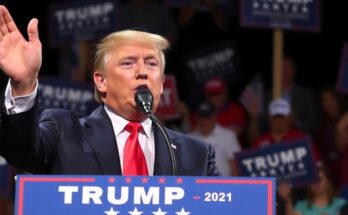Arizona’s recent elections have resulted in a significant Republican reinforcement, with Donald Trump poised for victory and a focus on public safety initiatives. While Democrat Ruben Gallego is on track to be the first Hispanic senator from Arizona, the state’s political landscape suggests increasing Republican control at both state and federal levels, with implications for future governance and legislative cooperation.
The recent election results in Arizona signify a notable consolidation of Republican influence within the state. Donald Trump, having previously lost Arizona in 2020, appears poised to reclaim victory in the state as results are tabulated. While Democrat Ruben Gallego is likely to secure a U.S. Senate seat, Republicans dominated several statewide offices, indicating a shift in the political landscape. The implications of this rightward trajectory could have significant ramifications for Democrats and the governance of Arizona as well as influence national politics. Trump’s resurgence illustrates a remarkable political comeback; he won both the popular vote and the Electoral College in a nationwide Republican wave. With a firm control over the Senate and prospective retention of power in the House, Republicans have established dominance over the federal government. The GOP now oversees a substantial portion of state legislatures, reflecting a shift towards Republican governance across various states, including Arizona. Democratic U.S. Representative Ruben Gallego’s anticipated Senate victory would mark the first time a Hispanic representative occupies this position from Arizona. Despite uncertainties surrounding vote tallies, Gallego’s lead against Republican Kari Lake suggests a promising outcome for Democrats. His win would reinforce the Democratic presence in the Senate alongside Mark Kelly, effectively contributing to a diversified representation in federal governance. Overall, the Republican retaking of the U.S. Senate complicates Democrats’ ability to counteract Trump’s agenda. The House remains split with Republicans leading; thus, achieving full control is essential for Democrats to mitigate potential policy shifts under Trump’s influence. The possibility of legislative gridlock looms over the Arizona House and Senate as Republicans may maintain or strengthen their advantage. This development may stifle collaborative governance due to partisan divisions, with the potential for significant political battles. Arizona’s judiciary remains unaffected by the election results, as voters opted to protect their Supreme Court justices. In addition, recent ballot measures reflected a prioritization of public safety, including initiatives addressing benefits for first responders and penalties for child sex trafficking. However, proposals aimed at reforming state politics were rejected, highlighting a resistance to altering the political structure significantly. In concluding, the electoral outcomes in Arizona reveal a strengthening Republican grip on the state, reshaping its political landscape. With potential ramifications for governance at both the state and federal levels, the evolving dynamics emphasize the importance of understanding this shift and its implications for various constituents in Arizona and beyond.
The election results in Arizona have prompted discussions on the implications of the Republican Party’s strengthened position within the state. Traditionally a swing state, Arizona’s political affiliations have fluctuated significantly, especially highlighted during the 2020 elections. The shift witnessed this cycle suggests a revitalized GOP influence that could alter legislative priorities and governance in the state, as well as affect national political dynamics given Arizona’s role as a swing state in federal elections. Key figures in this cycle include Donald Trump and Ruben Gallego, each representing differing political aspirations that underscore the growing polarization in American politics.
In summary, Arizona’s recent elections have solidified the Republican Party’s dominance, despite Democratic advancements in the Senate. The implications of this shift extend beyond state politics, influencing national trends as Republicans reclaim significant power. As Donald Trump continues to shape the Republican agenda, concerns regarding legislative gridlock and the future of bipartisan cooperation loom large. The vote on local propositions reveals a focus on public safety, further complicating political negotiations. Overall, the results call for increased attention to the evolving political landscape in Arizona.
Original Source: www.azcentral.com




